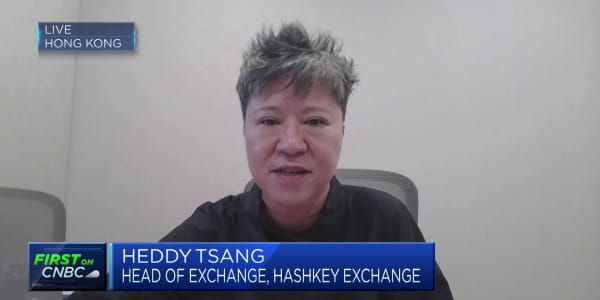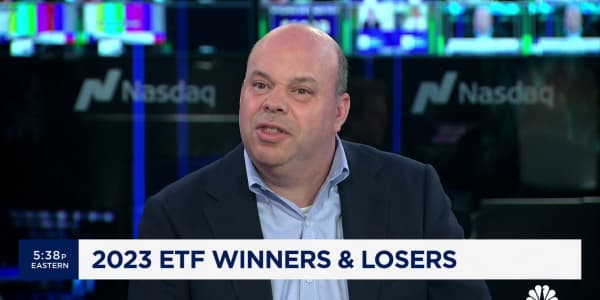After a raft of mixed earnings reports by semiconductor companies and some gigantic stock declines, it's fair to ask: How bad is it? And given the chip industry's status as one of the anchors of business investment in the economy, is the string of weak news a sign the country as a whole is headed for slower growth?
That question has loomed large in the stock market's gyrations this week. A market leader AMD stock dropped 21 percent on Wednesday night before a partial recovery Thursday, and Texas Instruments fell 8.8 percent after it reported that revenue was little changed in the third quarter as growth in its crucial auto segment slipped. The Philadelphia Semiconductor Index of 30 top chip companies is down 17 percent since Labor Day, including the biggest one-day drop in a decade on Wednesday.
The picture isn't unambiguous: An earnings beat from Intel late Thursday is helping to offset bad news from AMD and TI, and rival chipmaker Xilinx also beat expectations as growth in chips for 5G wireless and cloud-computing data centers offset a drop in demand for chips used in industrial and aerospace/military applications.
But slowing overall growth in chip sales and profits, albeit after a stellar 2017, has economists and market observers questioning whether technology investment is cresting — which, if true, would mean that the 2017 corporate tax cut is falling short of one of its most important goals.
"IT equipment and software investment is 28 percent of total nonresidential fixed investment," Moody's Analytics chief economist Mark Zandi said. "Real investment spending is on track to grow 8 percent annualized in the third quarter. This is similar to the growth in 2017. So no, I don't think the tax cuts have had any meaningful impact on IT investment."
Another concern is the fallout effect on the sector amid the U.S.-China trade war and concerns around China's economic growth. The White House implemented 10 percent taxes on $200 billion worth of Chinese imports in September. Those tariffs are set to rise to 25 percent by Jan.1 and could affect products manufactured with semiconductors.

For investors, one result of the chip slowdown has been falling prices for the nine major exchange-traded funds tied to semiconductor indices. The biggest, the $1.4 billion iShares PHLX Semiconductor ETF, fell 6.6 percent on Wednesday alone, according to ETF Database. The VanEck Vectors Semiconductor ETF, with $870 million in assets, posted its biggest downturn for the group since November 2008 on Wednesday. It had outflows of almost 40 percent of its assets last week.
Each chip company is a little bit different, based on the end market it serves, CFRA Research analyst Angelo Zino said. Texas Instruments' bobble has raised concerns in part because of slowing growth in its automotive markets, raising concern that if automakers are buying fewer sensors for Internet connectivity in machines, they may be anticipating a slowdown in their own sales.
"They tend to be a good barometer for the economy because their chips go into almost everything," said Zino. "Investors have to decide if it's a hard landing or a soft landing."
For now, Zino said, he's betting that the chip industry and TI are in for more of a soft landing than a hard fall — but that could change.
The rub is that TI, in particular, attributed its revenue slowdown to customers building inventories more slowly, or even reducing them — distributors, rather than companies that put chips into products, are slowing orders the most. That means the slowdown may just reflect more caution in the supply chain, rather than any major problem in markets for cars and cellphones, Zino said.
On the other hand, the market is worried that the chip slowdown may be an early indicator of problems that Trump's tariff increases this year are causing, and of issues that plans to impose 25 percent levies on $200 billion of Chinese exports to the United States in January might cause later, he said. But over time, even that would be overcome by secular trends like the rise of cloud computing and the Internet of things, he added.
AMD tanked because fourth-quarter guidance was 9 percent below consensus estimates and 18 percent lower than Goldman Sachs' prior expectation, Goldman analyst Toshiya Hari said in a note to clients. On big problem is the waning of the cryptocurrency craze, which cut into one high-profile market for AMD products, and the company isn't gaining market share in cloud-computing servers as fast as some investors expected.
[Semiconductor stocks] tend to be a good barometer for the economy because their chips go into almost everything.Angelo ZinoCFRA research analyst
But the problems are modest enough at AMD that Goldman left its $27 price target unchanged, Hari said.
AMD's expected market-share gains in data centers may simply have turned up at Intel, though. The industry's largest company said its data-center group boosted third-quarter revenue by 26 percent, the most of any Intel business segment. Overall, Intel earned $6.4 billion in the quarter on $19.1 billion in sales, both of which topped analysts' estimates.
"Our full-year [revenue] outlook is now up more than $6 billion from our January expectations," Bob Swan, Intel CFO and Interim CEO, said in a statement.
But the problems in automotive and industrial chip markets has chipmakers' earnings estimates falling for the first time in three years, Morgan Stanley analyst Joseph Moore said.
"Given the sharp declines in many stocks, we would not [initiate short positions that bet on shares to fall] right now, " Moore said. "We remain cautious, owing to our view of weaker-than-expected growth in 2019 and the increasing likelihood for downward estimate revisions. The bigger reset [in stock prices] could potentially occur in the [first quarter of 2019] based on the timing of when the weakness in the supply chain and extent of customer-inventory reduction catches up with semi companies. "
More from ETF Spotlight:
Why cash could become the biggest market winner of 2018
How to make more money in stocks after market drops
The Saudi 'oil weapon' and the energy market: What investors need to know





